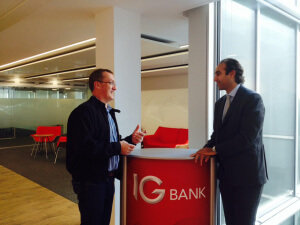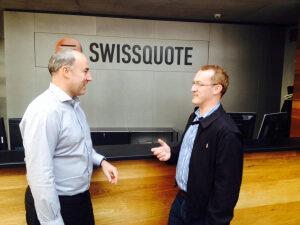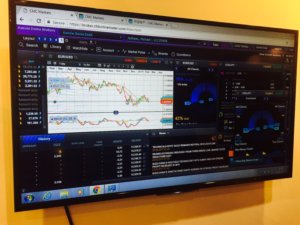Swiss-style FX ringfencing: Is this the antidote to continual regulatory encroachment on our industry?
The regulatory authorities across Europe are encroaching on the good in the industry and ignoring the bad. The ham-fisted means by which overhauls are implemented are a constant talking point. Is the Swiss way the right way to future-proof your brokerage? We investigate

Switzerland requires that all entities which operate within the FX industry, provide FX technology or operate as an electronic brokerage, are banks, and that there should be no variable factors which other companies face all the time in other parts of Europe. For example, in Switzerland, there are no companies which operate here by passporting from elsewhere under the MiFID rules which allow it, because Switzerland is not an EU member, and also does not allow any firm to operate without being a Swiss bank. All of the FX companies in Switzerland are fully regulated by Swiss banking licenses” – Fouad Bajjali, CEO, IG Bank, Geneva, Switzerland
It is a fact that continental regulatory directives aimed at making substantial changes to the method by which trading infrastructure is maintained and operated is very much the priority of the authorities that preside over the non-bank electronic trading industry’s conduct in Europe and North America.
With the imminent implementation of MiFID II, which after several delays is now on course for January 2018, many considerations are on the minds of executives within the mainstays of electronic trading within those regions.
It is opinion, however, that, although the ideology behind creating a transparent environment in which any anomalies, whether arising from erroneous conduct or downright malintent can be discovered quickly, the regulatory authorities that are responsible for actually ensuring that firms adhere to well-meaning directives are at best impotent, and at worse, ruddy useless.
The European Securities and Markets Authority (ESMA), which has set about painstakingly following the CFTC’s adherence to the 2010 Dodd-Frank Act in North America is indeed very well versed in understanding the technological, topographical and execution related components of an end to end trading system and the means by which all activity is conducted, however the two major regulatory authorities that oversee FX brokerages in the most populous FX trading centers in the European jurisdiction – the FCA and CySec – are too busy ensuring that the old school tie network is maintained on the golf course in the first instance, or pandering to the retail revenue-earners in the latter.

One of the gravest difficulties that faces the retail FX sector currently is that the vast majority of FX brokerages are operating a white label licensed version of MetaTrader 4, and then leasing their ‘infrastructure’ which usually involves sending their orders to another retail brokerage which then conducts its execution in the same vein as it would with its own direct retail clients, rather than send it to a prime of prime brokerage.
This type of set up is anathema to MiFID II’s stipulations in many ways, however the FCA and CySec would never pick this up as part of their regulatory oversight, because despite ESMA’s extensive and detailed directives on trading infrastructure which range from latency floors to connectivity, and from the need to publish all customer and trade information to providing full details of how a price was arrived at, which cannot be done effectively if it is being sent to another internalizer or if infrastructure is being leased from various third parties.
The FCA and CySec have demonstrated several times that their procedures are geared toward initial set up criteria for brokers, such as regulatory capital adequacy, and then becoming almost an arbitrator when a customer complains and making a token, reactionary fiscal penalty without having to make the compliance inspection that the NFA or CFTC would do in accordance with Dodd-Frank.
If they did, there would be little clarity, and if a broker wanted to ensure that it was on the right side of the regulations, it could not do so with conviction because most of the 1231 MetaTrader 4 retail brokers that exist have little control over their hosting, trade execution facilities and methodology, liquidity distribution and order flow, risk management or even the diversity of products offered on the trading platform which bears their logo.
FinanceFeeds has attempted to have discussions of this nature with senior level regulatory officials in many regions, including Cyprus, which is home to 154 MetaTrader 4 retail brokerages and whose FX industry is one of the island’s most important business sectors, however this has always been met with very little explanation, demonstrating a lack of understanding, which is at odds with the need to preserve the retail FX industry’s future as well as maintain a good name in the eyes of its clients.
Put simply, the blazer brigade that issue the licenses and then ensure criteria is met to maintain the licenses are government-employed automatons with very little knowledge of how a trading system operates, and why would they? It is only us, the senior executives within this industry that have spent their careers developing and designing, maintaining value over competition and driving this business forward that truly understand its components properly.
So what is the answer?
Add this to the perceived lobbying power that the listed derivatives sector has over the OTC industry in encouraging regulators to make changes to the core business of OTC firms, an example being the proposed methods by which CFDs can be provided to retail customers, and there must be an antidote.
In Switzerland, however, there is no regulatory purging of companies and no regulatory overhauls in the entire financial history of the country.
Switzerland is a brand in itself, a brand that sells security, financial, economical and societal, to the entire world.
No regulatory restructuring or cases of OTC firms being under the microscope of the Swiss banking authorities (FINMA) or third country authorities ever takes place, yet Switzerland is renowned for vault-like stability and good practice.

Perhaps the method by which regulatory overhauls, designed and defined by continental governing bodies and then implemented by inept civil servants has a bearing on the industry – that being to cause the quality firms to have to redefine their entire structure at great cost whilst allowing villains of the peace such as binary options fraudsters to run amok – would come to an end if things were done the Swiss way.
Swiss FX companies have to be registered as Swiss banks, and their entire topography must be proprietary. This means not only must the entire end to end system be designed in house, but it must all be kept on site – all the way from trading platform support and development to trading servers – and ringfenced to avoid any outside interference.
Designing a system such as this is expensive, yes, however it is less expensive than a broker losing his entire business, or having to put down $20 million in regulatory capital and then make expensive reports every day to a regulator which struggles to understand them.
That equation points to some sort of future proofing.
At Swissquote’s global headquarters in Gland, in the Vaud Canton of Switzerland, FinanceFeeds met with Ryan Nettles, Head of Forex Trading and Market Strategy, who explained how Swissquote structures its business.
The company builds its own proprietary systems, its own risk management as well as its own liquidity aggregator which connects to liquidity provision from Tier 1 banks and ECNs.

This is all hosted on an internal datacenter which is in the headquarters with some remote backup facilities, the entire system being completely ringfenced in accordance with Swiss regulations.
“Swissquote’s FX trading operation is very special” enthused Mr. Nettles. “Our systems operate in a totally automated manner. Our FX trading operation is managing trading volumes over 4 billion USD per day and is staffed by 9 traders whom have strong technical knowledge as the systems are completely computerized.”
“Rather than trading using traditional manual methods, our traders spend alot of their time purely conducting optimization with the help of our dedicated quant department and supervision as every component of our trading system, from price discovery and distribution to all of our platforms to execution with the clients and liquidity providers including risk management is completely automated. We do have the ability to override the system manually but we never need to do this under normal conditions” he explained.
“Our unique system helped us manage the SNB event well” – Ryan Nettles
“This fully automated, in-house system helped manage the SNB event which occurred on January 15 very well. Our aggregator is better and more advanced than many non-proprietary systems and the full automation allowed it to react very quickly to market conditions” he said.
Similarly, IG Bank, the Swiss division of British electronic trading mainstay IG Group, has similar considerations upon how to operate.
Meeting IG Bank’s CEO Fouad Bajjali recently in Geneva, FinanceFeeds understood the structure that is required.
The company specifically wanted to begin its foray into the otherwise very traditional Swiss banking environment by marking itself out with a very modern outlook. This is reflected in the company’s offices which would not be out of place in Singapore or Hong Kong, and are located in a building which is home to several Geneva fashion outfits and the Rooftop 42 bar which is a well known haunt for many of Switzerland’s top financial executives.
As far as establishing a new entity among the mainstays of Switzerland’s world renowned financial sector is concerned; Mr. Bajjali made the most accurate point that “Due to there only being a handful of competitors in our particular sector of the industry in Geneva, most of which are high end companies, it is actually easier to understand what the industry is about.”
“Switzerland requires that all entities which operate within the FX industry, provide FX technology or operate as an electronic brokerage, are banks, and that there should be no variable factors which other companies face all the time in other parts of Europe. For example, in Switzerland, there are no companies which operate here by passporting from elsewhere under the MiFID rules which allow it, because Switzerland is not an EU member, and also does not allow any firm to operate without being a Swiss bank. All of the FX companies in Switzerland are fully regulated by swiss banking licenses” he said.
Switzerland sells security
Mr. Bajjali explained that one of the most important points of a Swiss brokerage’s raison d’etre is client security.
“Technology is also a factor” said Mr. Bajjali. All of the Swiss FX companies have their own system as Switzerland has strict rulings on this matter, and the entire IT solution must be properly ringfenced.”
An example of a company that has this absolutely right is CMC Markets, which developed its Next Generation trading platform recently, at a cost of over $100 million, completely in house, its servers and infrastructure being based in-house at the firm’s 133 Houndsditch headquarters in London’s Square Mile.
CMC Markets effectively built its system in a way that ensures that its entire end to end structure is designed, developed, implemented and supported in house, as a proprietary end to end solution, thus the firm is in a very good position to refute any regulatory and infrastructural challenges that come the way of the retail sector with conviction in the way that a firm which owns none of its infrastructure would not be able to.
Future-proofing is vital at this point in the retail sector, and this may well be a solution.









